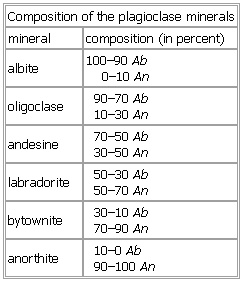Composition of the plagioclase minerals
- Composition of the plagioclase minerals
-
Composition of the plagioclase minerals
albite 100–90 Ab
0–10 An
oligoclase 90–70 Ab
10–30 An
andesine 70–50 Ab
30–50 An
labradorite 50–30 Ab
50–70 An
bytownite 30–10 Ab
70–90 An
anorthite 10–0 Ab
90–100 An
See as table:
* * *
Universalium.
2010.
Look at other dictionaries:
plagioclase — plagioclastic /play jee euh klas tik/, adj. /play jee euh klays /, n. any of the feldspar minerals varying in composition from acidic albite, NaAlSi3O8, to basic anorthite, CaAl2Si2O8, found in most igneous rocks: shows twinning striations on… … Universalium
Plagioclase — A photomicrograph of a plagioclase crystal under cross polarized light. The plagioclase crystal shows a distinct banding effect called a Polysynthetic twinning. (unknown scale) General Category … Wikipedia
plagioclase — pla•gi•o•clase [[t]ˈpleɪ dʒi əˌkleɪs[/t]] n. mir any of the feldspar minerals varying in composition from albite, NaAlSi3O8, to anorthite, CaAl2Si2O8 • Etymology: 1865–70 pla gi•o•clas′tic ˈklæs tɪk adj … From formal English to slang
plagioclase — /ˈpleɪdʒioʊˌkleɪz / (say playjeeoh.klayz), / ˌkleɪs/ (say .klays) noun any of the felspar minerals varying in composition from NaAlSi3O8 to CaAl2Si2O8, important constituents of many igneous rocks. {Greek plagio(s) oblique + klasis fracture} …
Geology of the Moon — The geology of the Moon (sometimes called selenology, although the latter term can refer more generally to lunar science ) is quite different from that of the Earth. The Moon lacks a significant atmosphere and any bodies of water, which… … Wikipedia
Internal structure of the Moon — The Moon is a differentiated body, being composed of a geochemically distinct crust, mantle, and core. This structure is believed to have resulted from the fractional crystallization of a magma ocean shortly after its formation about 4.5 billion… … Wikipedia
Cinder Cone and the Fantastic Lava Beds — For the generic cinder cone, see cinder cone. Cinder Cone Cinder Cone is a 700 foot (213 m) high cone of loose scoria … Wikipedia
Geology of the Australian Capital Territory — Australia grew around three fused pieces of very ancient continental crust (cratons). The geology of the Australian Capital Territory includes rocks dating from the Ordovician around 480 million years ago, whilst most rocks are from the Silurian … Wikipedia
List of minerals (synonyms) — It is currently not possible to have a complete list of minerals . The International Mineralogical Association (IMA) is the international group that recognises new minerals and new mineral names, however minerals discovered before 1959 did not go … Wikipedia
Europium anomaly — The Europium anomaly, in geochemistry, is the phenomenon whereby Europium (Eu) concentration is either depleted or enriched in a rock relative to the other rare earth elements (REEs). A Eu anomaly is said to be negative if Eu is depleted relative … Wikipedia

